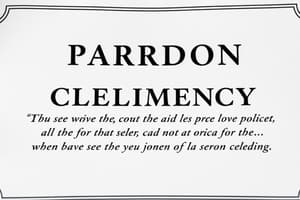Podcast
Questions and Answers
What is the main purpose of a commutation of sentence?
What is the main purpose of a commutation of sentence?
- To increase the severity of punishment
- To reduce the sentence imposed to a lesser punishment (correct)
- To grant pardon to the offender
- To impose death penalty on the convict
When is an absolute pardon effective?
When is an absolute pardon effective?
- When it is not subject to any condition whatsoever (correct)
- When the President recommends it
- When it must be accepted by the offender
- When it is given subject to conditions
What does a pardon granted by the President do?
What does a pardon granted by the President do?
- Restores offices, property, and vested rights
- Restores full civil and political rights (correct)
- Removes all civil liabilities
- Discharges civil liability to the wronged individual
What is one limitation on the pardoning power of the President?
What is one limitation on the pardoning power of the President?
Who has the authority to grant commutation of sentence?
Who has the authority to grant commutation of sentence?
What type of executive clemency is a pardon?
What type of executive clemency is a pardon?
Who has the power to grant reprieves, commutations, and pardons?
Who has the power to grant reprieves, commutations, and pardons?
Can the courts inquire into the wisdom of any pardon granted by the President?
Can the courts inquire into the wisdom of any pardon granted by the President?
What offenses does the Pardoning Power extend to according to the text?
What offenses does the Pardoning Power extend to according to the text?
Can anyone be exempted from punishment through a presidential pardon?
Can anyone be exempted from punishment through a presidential pardon?
Flashcards are hidden until you start studying
Study Notes
Pardoning Power of the President
- The President's pardoning power is an act of grace that exempts an individual from punishment for a crime they committed.
- The power is vested in the Executive, discretionary, and not subject to review by the courts or limitations by the Legislative Branch.
Legal Basis of the Pardoning Power
- Article VII, Section 19 of the 1987 Philippine Constitution grants the President the power to grant reprieves, commutations, and pardons.
- The President also has the power to grant amnesty.
Characteristics of the Pardoning Power
- The President's discretion is absolute, and the courts cannot inquire into the wisdom or reasonableness of a pardon.
- The power extends to all offenses, including criminal contempt.
- It does not exempt anyone from the law, but rather from punishment.
Constitutional Definition of Pardon
- Pardon is an act of grace that exempts an individual from punishment for a crime they committed.
Kinds of Pardon
- Absolute Pardon: not subject to any condition and becomes effective when made.
- Conditional Pardon: given subject to conditions or qualifications and must be accepted by the offender to become effective.
Limitations of the Pardoning Power
- May not be exercised for offenses in impeachment cases.
- May only be exercised after conviction by final judgment.
- No pardon, parole, or suspension of sentence may be granted for violations of election law or rules and regulations without the recommendation of the COMELEC.
Effects of Pardon
- Removes penalties and disabilities and restores civil and political rights.
- Does not discharge civil liability to the individual wronged.
- Does not restore offices, property, or rights vested in others due to conviction.
Commutation of Sentence
- Commutation is the reduction of a sentence to a lesser punishment.
- May be granted without the acceptance and even against the will of the convict.
- Purposes of commutation include breaking the rigidity of the law, extending parole, and saving lives of those sentenced to death.
Procedure for Commutation
- The condemned person or the head of the prison system may file a petition for commutation.
- The prisoner undergoes social, psychological, and psychiatric examinations to determine their degree of involvement in the crime.
- The petition is forwarded to the Board of Pardons and Parole with reports of examinations and recommendations.
- The Board deliberates on a recommendation after a careful study of the papers.
Studying That Suits You
Use AI to generate personalized quizzes and flashcards to suit your learning preferences.




